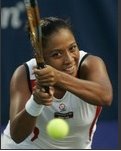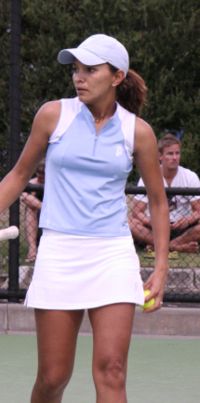Showing posts with label Richard Russell. Show all posts
Welcome Tennis Lovers!!
...
EXCLUSIVE! Living Legend Richard Russell Of Jamaica Shares A Bit Of His History On And Off The Court, Occasionally Standing In For Friend Arthur Ashe
Monday, July 1, 2019
 |
| Jamaican Richard Russell (R) and American Arthur Ashe, Jr. (L) (All media property of Richard Russell) |
Speaking with Richard Russell was sublimely gratifying. How I adored the peaceful pleasure emanating from that rich classic Jamaican accent. Given this conversation, I am so looking forward to doing it again.
Mr. Russell is a man of tremendous spirituality, inner peace and joy. He enjoys his life today with a tremendous depth of gratitude from all of his life experiences, with a special emphasis on his tennis journey. Some of his best times were spent with "look-a-like friend" Arthur Ashe, Jr.
He is a living legend and a member of the 2019 class of inductees into the Black Tennis Hall of Fame. Although he was unable to attend the induction ceremony, he is overjoyed and grateful for the induction.
Mr. Russell is the only Jamaican to qualify for and win matches at all Grand Slam Championships. He was the youngest national champion at age 16, a founding member of the ATP (Association of Tennis Professionals) and, in 1966 achieved the distinction of holding the record of winning a first round match at the Australian Open 6-0, 6-0, 6-0. He represented the Jamaican Davis Cup and had wins over Arthur Ashe and Charlie Pasarell.
CONVERSATION
How are you? I so LOVED the photos that you shared with me that I had to speak with you. Thank you, thank you, I am in good spirits.
So glad that you are being inducted into the Black Tennis Hall of Fame. It's a big honor, thank you very much.
What are your thoughts on the induction? A year ago I was being inducted into the Jamaican Hall of Fame (Jamaica Cup Hall of Fame) and I got a call around 6:30 in the morning and it was someone that I hadn't spoken to in a year or two. He said "Are you fine?" I said "Yeah I'm good." He said, "You sure you're okay?" I said, "Yes." He said, "Well, my wife said to call you and congratulate you because I saw in the newspaper that you're being inducted into the Jamaican Hall of Fame, but we were so concerned, because usually when these things happen, you're either dead or dying. I'm glad you're okay." That was so funny.
 |
| Richard, Arthur Ashe, Lance Lumsden |
When we were in Australia together he begged me, he said "Richard, I can't sign anymore autographs, can you sign some for me?" The thing about it is this, when people would come to me, and the more I would tell then I'm not Arthur Ashe, the more they would think that I was pulling their legs. You see, in Australia, any Black person look alike to them, they can't tell one from the other.
That sounds like America too! That's funny.
But in cricket, we (Jamaica) have very good cricketers, all of them, when they would go to Australia, they were swamped, people all over them. And when I was there, they would think I was a Caribbean cricketer, they can't tell one from the other.
Quite honestly, Arthur and I, we kind of had similar hair cuts. In the Australian newspaper photo that I sent you where he and I are standing together, the Australian press couldn't believe it, the guy taking the picture said, "I can't tell one of you from the other! I can't tell which is Arthur Ashe and which is Richard Russell." I said, "I'm Richard Russell!" It was hilarious.
Life must have been something else at the time. Oh, it was unbelievable. Arthur was such a special person, who is gone too soon. What an extraordinary human being. You know, he kept so much inside of himself. I went to Indianapolis to play, and one of the club members there who I became friends with said, "You know last year Arthur Ashe came with the Davis Cup team and he wasn't allowed to change in the official men's change room. It was such an embarrassment. Well, he came, he played, and he said nothing. Nobody made a stink over it. That is outrageous.
 This is going back to 1966-1968. I played in Pensacola, Florida, I didn't know that they had an emergency board meeting to decide whether for me to be able to play, or not to play. They decided that I'm not an American, I'm Jamaican, and those are the grounds on which they allowed me to play, cause it would have been a hell of a problem, because the Caribbean Circuit had been started, the whole thing would've been turned upside down if they had said I couldn't play. Arthur couldn't play there, and I was in shock, absolutely. And there were other situations, very similar. Just as in Washington D.C. where the mayor was Black, they had over 50% Black population, and I was staying as a guest, one block from the Washington Golf and Country Club, myself and Pancho Guzman of Ecuador, we were there to play their big tournament which is after Wimbledon. The people who were members of the Club, one of them in particular said to me, "Listen, we have courts booked for you guys at the Club, but on second thought, I don't want anybody to be embarrassed, so you will probably need to go and play somewhere else." He said, "Do you know that the mayor of Washington is Black, and he can't even come here." So we ended up going 20 minutes away to practice. The following year I went back there, and the same family insisted that I come and stay with them, and the first thing that was said to me was, "You know, when you left here, we cancelled our membership with the Washington Golf and Country Club. We are now members of another club which is 15 minutes away. I just need for you to know that. You being here made us realize that we cannot be a part of a situation like this. Having an international tennis player coming, and because you're Black, we cannot take you to the club - that's unacceptable."
This is going back to 1966-1968. I played in Pensacola, Florida, I didn't know that they had an emergency board meeting to decide whether for me to be able to play, or not to play. They decided that I'm not an American, I'm Jamaican, and those are the grounds on which they allowed me to play, cause it would have been a hell of a problem, because the Caribbean Circuit had been started, the whole thing would've been turned upside down if they had said I couldn't play. Arthur couldn't play there, and I was in shock, absolutely. And there were other situations, very similar. Just as in Washington D.C. where the mayor was Black, they had over 50% Black population, and I was staying as a guest, one block from the Washington Golf and Country Club, myself and Pancho Guzman of Ecuador, we were there to play their big tournament which is after Wimbledon. The people who were members of the Club, one of them in particular said to me, "Listen, we have courts booked for you guys at the Club, but on second thought, I don't want anybody to be embarrassed, so you will probably need to go and play somewhere else." He said, "Do you know that the mayor of Washington is Black, and he can't even come here." So we ended up going 20 minutes away to practice. The following year I went back there, and the same family insisted that I come and stay with them, and the first thing that was said to me was, "You know, when you left here, we cancelled our membership with the Washington Golf and Country Club. We are now members of another club which is 15 minutes away. I just need for you to know that. You being here made us realize that we cannot be a part of a situation like this. Having an international tennis player coming, and because you're Black, we cannot take you to the club - that's unacceptable."TOTALLY! So, very interesting times, the 60s and the 70s.
Unfortunately, here in America, not to much amazement, many aspects of those times exist today. I realize that. When Arthur won Wimbledon he was given automatic membership, and the rules at Forest Hills were, if you win the U.S. Open you get automatic membership, and a year later Arthur Ashe still wasn't given membership. They couldn't accept him, they had no Black members. It was about three weeks before the U.S. Open of the following year where the PTR and ATP were going to get involved and they were thinking about him even boycotting Forest Hills. But somebody in the Club really stepped up and granted him formally the membership prior to the event. It took them one year to sort it out for him to get membership.
 At the beginning of your career, did you even think that you would be as successful as you became, or did you surprise yourself? I think my father, well, I had no intentions of being a tennis player, that was the last thing in my mind. I was a cricketer - I was the youngest schoolboy cricketer in Jamaica. Everything was pointing to me becoming a high rated cricketer for the Caribbean, for the West Indies. My school teacher, the person in charge of tennis, had nobody to play on the tennis team, so he went on the field and took the best cricketers off and said "You're representing the school in tennis in two weeks times, so you have to come half an hour before you go to cricket and learn to play tennis. And then he entered me into the national championships and I got to the finals.
At the beginning of your career, did you even think that you would be as successful as you became, or did you surprise yourself? I think my father, well, I had no intentions of being a tennis player, that was the last thing in my mind. I was a cricketer - I was the youngest schoolboy cricketer in Jamaica. Everything was pointing to me becoming a high rated cricketer for the Caribbean, for the West Indies. My school teacher, the person in charge of tennis, had nobody to play on the tennis team, so he went on the field and took the best cricketers off and said "You're representing the school in tennis in two weeks times, so you have to come half an hour before you go to cricket and learn to play tennis. And then he entered me into the national championships and I got to the finals.My father, who was saving up for four or five years to put in a swimming pool that the family wanted, when he saw me in the national championships, he went home and measured the front lawn and said he's putting in a tennis court. He put a wall in the tennis court and instructed me that I am not going to school unless I play tennis for half an hour against the wall every morning.
Wow... Much to the displeasure of my poor mother who had all of her imported roses in the front of the house, she now had to move them to the side of the house. And when I was late for school, she was in tears saying that I was late, and my father would say, "No he's not late, he's only missing chapel, he's not missing school."
My father apparently read in those days that all the top Australian players learned to play against the garage wall at their house, so my father had me, seven days a week, half an hour against the wall, and then I became the youngest national champion of Jamaica by 16. And that started the whole thing. He picked up the phone, called Australia, asked about the great Harry Hopman (didn't know him at all), and he got a hold of him and said "My son has just become the youngest national champion of Jamaica and I don't know what to do with him," and Harry Hopman said, "Put him on a plane and send him to me." And off I went, that was
the start of my whole development, spending a year with Harry Hopman in Australia.
 Now that you had begun playing so well, even though that was not your intent, did you come to love the sport? Well, absolutely I did, but I think the passion was my father's. All of our entire family were all sports people, my father, his brothers, all very good sports people, they played all the sports. My father said to me, "Son, we have played all the sports, and if you're going to get really good at any one sport, you have to focus on one, you can't play all the sports. And it's easier for you to play tennis than play cricket. So, we put in the tennis court, and we're going to do everything possible for you to improve your tennis." So he was really the driving force until, at least, I got to a certain point where obviously "I" wanted to get better and improve.
Now that you had begun playing so well, even though that was not your intent, did you come to love the sport? Well, absolutely I did, but I think the passion was my father's. All of our entire family were all sports people, my father, his brothers, all very good sports people, they played all the sports. My father said to me, "Son, we have played all the sports, and if you're going to get really good at any one sport, you have to focus on one, you can't play all the sports. And it's easier for you to play tennis than play cricket. So, we put in the tennis court, and we're going to do everything possible for you to improve your tennis." So he was really the driving force until, at least, I got to a certain point where obviously "I" wanted to get better and improve. Yeah, so now you began to personally enjoy it. Exactly, but my father gets all of the credit initially for even getting me involved.
As you look back at your career now, what do you think about it? Well, tennis has provided me every... single... thing... I have in life. It is the most extraordinary sport of all time. It has opened every door, and every business transaction that I've gone into. Tennis just somehow... the doors were just opened. I can't think of anything more fulfilling than my involvement in tennis over the years.
 By extension, I got my sons involved in tennis and even at the expense of their school work at one point. And one of my son's said to me, and I have never forgotten this in my life, he said "Dad, I want to say something to you. I want to thank you for keeping me in tennis. Dad, do you know that the particular academy where I am, I am over subscribed. I am full, and I have a waiting list. Some of my closest friends, university graduates, can't get a job, or some of them, they're taking a job two levels below their qualifications, and here am I, over subscribed. Tennis is the greatest sport there is on earth." I said to myself, "Oh, thank God." I said, "You know something, thank you very much for that."
By extension, I got my sons involved in tennis and even at the expense of their school work at one point. And one of my son's said to me, and I have never forgotten this in my life, he said "Dad, I want to say something to you. I want to thank you for keeping me in tennis. Dad, do you know that the particular academy where I am, I am over subscribed. I am full, and I have a waiting list. Some of my closest friends, university graduates, can't get a job, or some of them, they're taking a job two levels below their qualifications, and here am I, over subscribed. Tennis is the greatest sport there is on earth." I said to myself, "Oh, thank God." I said, "You know something, thank you very much for that."My feeling is that education is for a lifetime, and I had a scholarship to Louisville, Kentucky and my father sent me to Australia - that was his decision. Looking back at it now, the education I got traveling the world, my interactions with people, the broadening of your whole horizon, you get this only from this wonderful exposure. And to play a sport like tennis where you're literally traveling the world for free, playing different tournaments, meeting different ethnic groups, it is almost a dream, almost a fantasy world really, when you think about it.
Coming back home to Jamaica, it was like I ended up being a big fish in a small pond. You go anywhere, I got into manufacturing. My prime minister called me, Michael Manley, he also played tennis, he said, "Richard, I didn't know you had so many styles of shorts." Because what happened was, everybody didn't know what to give the prime minister, so you know what they did? They gave him Richard Russell tennis shorts! He said, "I have all these different shorts from different people. I didn't know you had so many styles of shorts!" It was funny.
So many doors opened, it's gratifying even until today. You go anywhere, people recognize you, people respect you, people love you, you give the love back and interact with people, you help out the young kids and you get satisfaction from helping people. I said to myself, "You know, the greatest satisfaction you get in life isn't from earning money, but the people you help, especially those less fortunate." Stop and think about it for a little bit, and as you get older, you recognize this more and more. And your legacy is for people to remember you for the good deeds that you've done for people.
 Indeed, indeed, indeed. That's your legacy - it's wonderful satisfaction.
Indeed, indeed, indeed. That's your legacy - it's wonderful satisfaction.Tell me this, in directing your tennis academy, what is the single highest priority in the lessons that you teach - what's the most important thing that you want them to learn? Being able to get the kids on the court and for them to have fun, to enjoy the sport, to express to them that this may be the greatest sport in the world, especially recognizing young girls and the college opportunities that are available to them. That this is the only sport in the entire world where there's equal prize money for men and women. I tell them you have no idea how special this sport is, the tennis scholarships, the opportunities. By learning to play tennis, you can use it to further your education. That's one of the main features, talking to the young kids and impressing upon the parents the opportunities that exist through a sport like tennis. We're here to help them move up the ladder, and maybe to consider tennis careers down the road.
Read the rest of this post...........
Posted by Shelia at 11:00 AM Labels: Arthur Ashe, Australian Open, Black Tennis Hall of Fame, cricketer, Harry Hopman, Jamaica, Richard Russell, U.S Open, Wimbledon Email this post
CONGRATULATIONS!! 2019 Black Tennis Hall of Fame Inductees
Thursday, April 18, 2019
Being honored by induction into the 2019 Black Tennis Hall of Fame are the following individuals in their respective categories:
PIONEERS
Nathaniel and Franklyn Jackson
Theodore (Ted) Thompson
PLAYERS/CONTRIBUTORS
Richard Russell
Chanda Rubin
Phil Williamson
Benny Sims, Jr.
REGIONAL LEGENDS
Dr. Emily Moore
Arvelia Myers
Lonnie White
Norvell A. Brown
Full bios can be read here.
Read the rest of this post...........
Posted by Shelia at 3:33 AM Labels: Arvelia Myers, Benny Sims, Chanda Rubin, Emily Moore, Lonnie White, Nathaniel Franklyn Jackson, Norvell Brown, Phil Williamson, Pioneers, Players/Contributors, Regional Legends, Richard Russell, Theodore Thompson Email this post
Black Tennis Hall Of Fame 12th Annual Induction Ceremony Headed To Brooklyn, NY For 2019 Ceremony
Monday, March 25, 2019
Posted by Shelia at 4:55 PM Labels: Arvelia Myers, Benny Sims, Black Tennis Hall of Fame, Chanda Rubin, Franklyn Jackson, Induction Ceremony, Nathaniel Jackson, Norvell A. Brown, Phillip Williamson, Richard Russell, Theodore Thompson, USTA Email this post
Subscribe to:
Comments (Atom)


















































































![Validate my Atom 1.0 feed [Valid Atom 1.0]](valid-atom.png)
